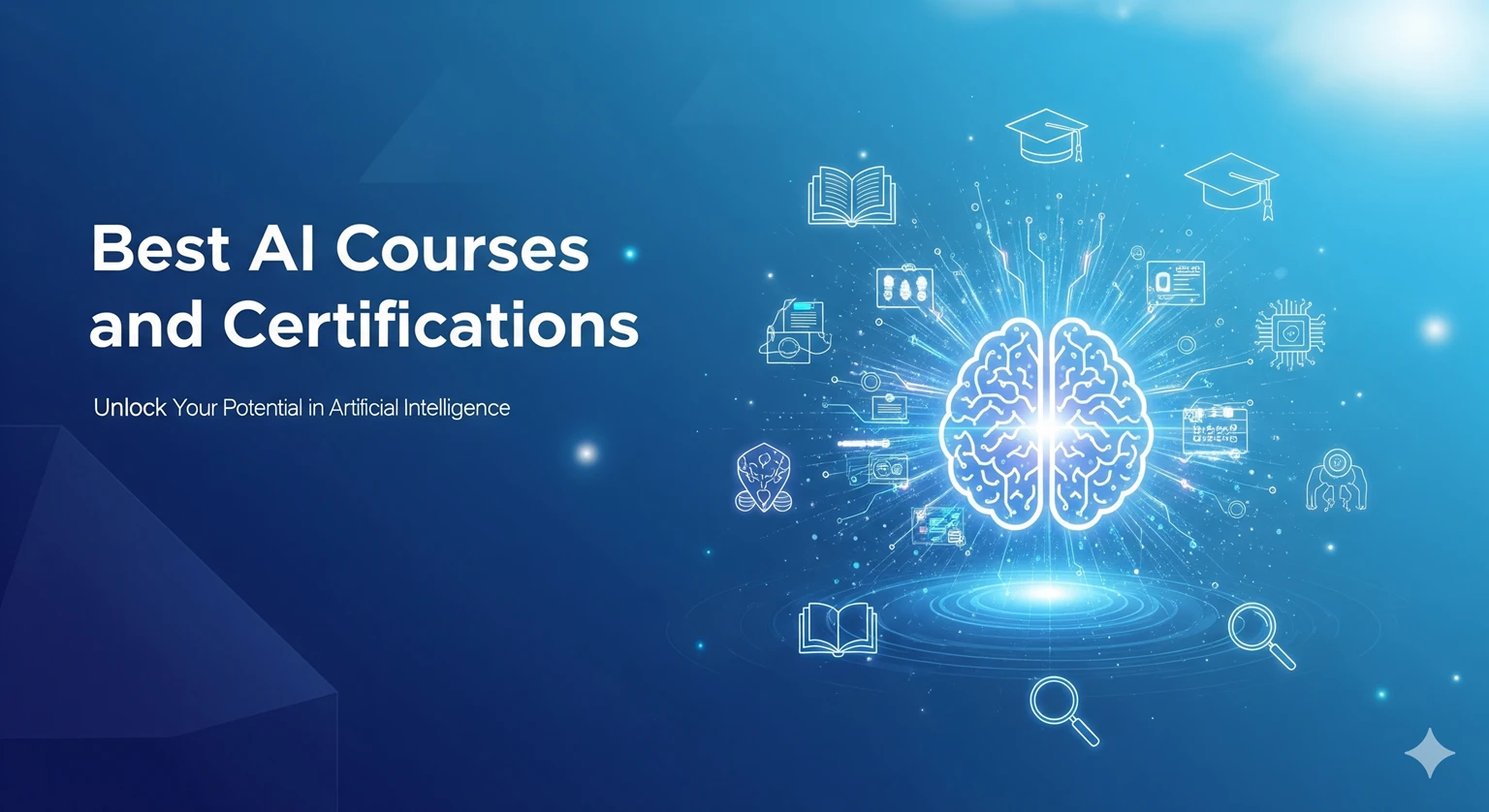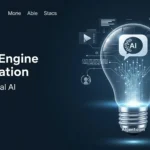The landscape of artificial intelligence is evolving at an unprecedented pace, transforming industries and creating a surge in demand for skilled AI professionals. As we look towards 2025-26, the need for individuals proficient in machine learning, deep learning, natural language processing, and data science will only intensify. Whether you’re a seasoned professional looking to upskill or a newcomer eager to break into this dynamic field, choosing the right educational path is crucial. This comprehensive guide will navigate the best AI courses and certifications available, helping you make an informed decision to kickstart or advance your AI career.
Table of Contents

The Growing Demand for AI Expertise
The global AI market is projected to grow significantly, with various reports indicating a compound annual growth rate (CAGR) well over 30% in the coming years. This explosive growth translates directly into job opportunities across sectors such as healthcare, finance, automotive, retail, and manufacturing. Roles like AI Engineer, Machine Learning Engineer, Data Scientist, AI Researcher, and AI Ethicist are not just buzzwords; they represent the forefront of technological innovation and offer lucrative career paths.
Companies are investing heavily in AI to automate processes, gain deeper insights from data, enhance customer experiences, and develop groundbreaking products. This sustained investment creates a constant need for a workforce that understands AI principles, can implement complex algorithms, and can critically evaluate AI systems. Therefore, obtaining relevant certifications and completing specialized courses is no longer just a bonus – it’s often a prerequisite for entry and advancement in many AI-related roles.
Learn more about AI’s transformative impact in Is AI Going to Take Your Job? The Truth About the Future of Work.
Key Areas of AI Specialization
Before diving into specific courses, it’s essential to understand the major branches of AI where you might want to specialize:
- Machine Learning (ML): The foundation of modern AI, focusing on algorithms that learn from data to make predictions or decisions without being explicitly programmed.
- Deep Learning (DL): A subfield of ML inspired by the structure and function of the human brain, using neural networks with many layers to learn complex patterns. Crucial for image recognition, speech recognition, and natural language processing.
- Natural Language Processing (NLP): Deals with the interaction between computers and human language, enabling machines to understand, interpret, and generate human speech.
- Computer Vision: Enables computers to “see” and interpret visual information from the world, used in autonomous vehicles, facial recognition, and medical imaging.
- In simple terms, data science is all about using scientific methods, algorithms, and systems to get valuable knowledge and insights out of data, whether it’s neatly organized or completely unstructured. Think of AI as a powerful tool that helps data scientists achieve this.
- AI Ethics and Governance: A crucial emerging field focusing on the responsible development and deployment of AI systems, addressing bias, fairness, transparency, and privacy.
For insights on how AI is revolutionizing industries like finance, read How Artificial Intelligence Is Changing Stock Trading.
Top AI Courses and Certifications for 2025-26
Our selection balances academic rigor, industry relevance, hands-on experience, and career impact. We’ve considered offerings from leading universities, tech giants, and specialized online learning platforms.
1. Google Cloud Professional Machine Learning Engineer Certification
Focus: Practical application of ML models on Google Cloud Platform (GCP).
Why it’s important: Google Cloud is a major player in the cloud computing space, and this certification validates your ability to design, build, and productionize ML models using Google’s robust infrastructure. It covers data preprocessing, model training, deployment, and ongoing management.
Ideal for: Aspiring ML engineers and data scientists who want to specialize in cloud-based ML solutions.
Prerequisites: Familiarity with Python, basic ML concepts, and GCP fundamentals.
2. AWS Certified Machine Learning – Specialty
Focus: Designing, implementing, deploying, and maintaining ML solutions on Amazon Web Services (AWS).
Why it’s important: AWS holds the largest market share in cloud computing, making this a highly sought-after certification. It tests your expertise across various ML aspects, from data engineering and exploratory data analysis to modeling and ML implementation.
Ideal for: Professionals aiming for ML engineering or data science roles within AWS-centric organizations.
Prerequisites: At least two years of hands-on experience with ML and deep learning workloads, and familiarity with AWS services.
3. DeepLearning.AI’s Deep Learning Specialization (Coursera)
Taught by: Andrew Ng (co-founder of Coursera, founder of Google Brain).
Focus: Comprehensive deep dive into the fundamentals of deep learning, including neural networks, convolutional neural networks (CNNs), recurrent neural networks (RNNs), and transformers.
Why it’s important: This specialization is widely regarded as one of the best entry points into deep learning. Andrew Ng’s clear explanations and hands-on programming assignments using TensorFlow and Keras provide a strong foundation.
Ideal for: Beginners with some programming experience (Python) and linear algebra, who want to understand the core concepts of deep learning.
Prerequisites: Intermediate Python, basic linear algebra.
4. IBM AI Engineering Professional Certificate (Coursera)
Focus: End-to-end AI solution development, from data acquisition and preparation to model deployment and monitoring. Covers ML, deep learning, and computer vision with tools like Scikit-learn, TensorFlow, and PyTorch.
Why it’s important: IBM is a significant innovator in AI, and this certificate offers a practical, project-based approach to building AI solutions. It also touches upon important concepts like MLOps.
Ideal for: Aspiring AI engineers and developers looking for a comprehensive, industry-backed program.
Prerequisites: Python programming experience.
5. Microsoft Certified: Azure AI Engineer Associate
Focus: Building, managing, and deploying AI solutions using Azure AI services.
Why it’s important: Microsoft Azure is a rapidly growing cloud platform, and this certification validates skills in using Azure Machine Learning, Cognitive Services, and Bot Framework to create intelligent applications.
Ideal for: AI engineers and developers specializing in Microsoft’s cloud ecosystem.
Prerequisites: Knowledge of Python, C#, or JavaScript, and experience with Azure.
6. NVIDIA Deep Learning Institute (DLI) Certifications
Focus: Specialized, hands-on training in various deep learning applications, often with a focus on GPU-accelerated computing.
Why it’s important: NVIDIA is at the forefront of AI hardware and software. DLI courses provide practical, cutting-edge skills in areas like computer vision, natural language processing, and robotics using NVIDIA’s platforms and tools (e.g., CUDA, cuDNN).
Ideal for: Professionals seeking highly specialized skills in specific deep learning domains, especially those working with GPU-accelerated workloads.
Prerequisites: Varies by course, but generally requires Python and some deep learning knowledge.
7. Stanford University’s Machine Learning Course (Coursera)
Taught by: Andrew Ng.
Focus: Foundational concepts of machine learning, including linear regression, logistic regression, neural networks, support vector machines, and unsupervised learning.
Why it’s important: This classic course (though using Octave/MATLAB, it teaches core concepts transferable to Python) provides a rigorous academic introduction to ML. While the Deep Learning Specialization covers more recent advancements, this course is excellent for solidifying fundamental understanding.
Ideal for: Individuals wanting a strong theoretical understanding of traditional ML algorithms.
Prerequisites: Basic programming knowledge, linear algebra.
8. MIT Professional Education – Applied Data Science Program
Focus: A more extensive, graduate-level program covering data science fundamentals, machine learning, and specific applications like natural language processing.
Why it’s important: MIT is a world leader in computer science and AI. This program offers a deep, university-grade education with a practical focus, providing a strong credential.
Ideal for: Professionals seeking a rigorous, executive-level education and a prestigious credential from a top university.
Prerequisites: Strong quantitative background, programming experience (preferably Python).
Factors to Consider When Choosing a Course
Your Current Skill Level: Are you a complete beginner, or do you have some programming and math background?
Career Goals: Are you aiming for an ML Engineer, Data Scientist, AI Researcher, or a more specialized role?
Time Commitment: How much time can you realistically dedicate each week? Some programs are intensive, while others are more flexible.
Learning Style: Do you prefer self-paced learning, structured programs, hands-on projects, or theoretical lectures?
Cost: Courses range from free to several thousands of dollars. Consider your budget and the potential ROI.
Industry Relevance: Does the course focus on tools and technologies widely used in the industry (e.g., Python, TensorFlow, PyTorch, major cloud platforms)?
Instructor Expertise: Learning from leading experts and practitioners can significantly enhance your understanding and credibility.
Hands-on Projects: Practical experience is invaluable. Look for courses that emphasize real-world projects and portfolio building.
Explore how AI is driving stock market trends in AI Stocks & the Magnificent Seven: Bubble or Boom?.
Beyond the Certifications: Continuous Learning
The field of AI is dynamic. What’s cutting-edge today might be standard practice tomorrow. To truly excel, continuous learning is non-negotiable.
- Stay Updated: Follow leading AI researchers, blogs (e.g., Google AI Blog, OpenAI Blog, NVIDIA Blog), and research papers (arXiv).
- Practice Coding: Regularly work on personal projects, participate in Kaggle competitions, and contribute to open-source AI projects.
- Network: Attend AI conferences, meetups, and join online communities to connect with peers and mentors.
- Read Books: Delve into classic AI textbooks and newer publications to deepen your theoretical understanding.
For more on optimizing your digital presence in the AI era, check out Answer Engine Optimization: Conversational AI & SEO Trends 2025–26.
Conclusion
Embarking on an AI career in 2025-26 offers immense potential for innovation and personal growth. By carefully selecting the right courses and certifications, you can build a robust skill set that is highly valued by employers. Whether you choose a cloud-specific certification, a foundational deep learning specialization, or a comprehensive university program, the key is to prioritize hands-on experience, a strong theoretical understanding, and a commitment to lifelong learning. The future of AI is bright, and with the right education, you can be at the forefront of shaping it.
For additional AI learning resources, visit Coursera.
FAQs: Best AI Courses and Certifications to Kickstart Your Career in 2025-26
Q1: What is the single “best” AI certification to get?
There isn’t a single “best” certification as it largely depends on your career goals, current skill level, and desired specialization. For cloud-centric roles, AWS or Google Cloud ML certifications are excellent. For foundational deep learning, Andrew Ng’s Deep Learning Specialization is highly recommended. The “best” one aligns with your specific career path.
Q2: Do I need a degree in Computer Science to pursue an AI career?
While a Computer Science degree provides a strong theoretical foundation, it’s not strictly necessary. Many successful AI professionals come from diverse backgrounds (e.g., mathematics, statistics, engineering, physics). Online courses and certifications can provide the necessary technical skills. A strong grasp of programming (especially Python), linear algebra, calculus, and statistics is generally more important than a specific degree.
Q3: How much math do I need to know for AI?
A solid understanding of linear algebra, calculus, and probability/statistics is crucial. These mathematical concepts underpin most machine learning and deep learning algorithms. Many courses will provide a refresher, but having a basic understanding before starting will significantly aid your learning.
Q4: How long does it take to get an AI certification?
The duration varies widely. Some specialized courses can be completed in a few weeks (e.g., NVIDIA DLI), while professional certificate programs (like those on Coursera) can take 3-6 months of dedicated study, and more extensive university programs can span a year or more.
Q5: Are free AI courses sufficient to get a job?
Free courses can be an excellent starting point for learning fundamentals and exploring your interest in AI. Resources like freeCodeCamp, Kaggle Learn, and introductory courses on Coursera/edX can build a basic understanding. However, for a competitive edge and comprehensive skills, paid certifications and more in-depth programs are often necessary to demonstrate advanced capabilities and practical project experience to employers.
Q6: Should I focus on a specific AI domain (e.g., NLP, Computer Vision) or try to learn everything?
It’s beneficial to start with a broad understanding of core AI and machine learning concepts. Once you have a strong foundation, specializing in a particular domain like NLP or Computer Vision can make you a more attractive candidate for specific roles. However, the field is interdisciplinary, so maintaining a general awareness of advancements across different domains is also important.
Q7: How important are hands-on projects and a portfolio?
Extremely important! Employers value practical experience. Courses that include hands-on projects are invaluable. Building a portfolio of personal projects, participating in Kaggle competitions, and contributing to open-source AI projects demonstrates your ability to apply theoretical knowledge to real-world problems, which can be more impactful than just certifications alone.
© 2025 AIGEN1. All rights reserved.


